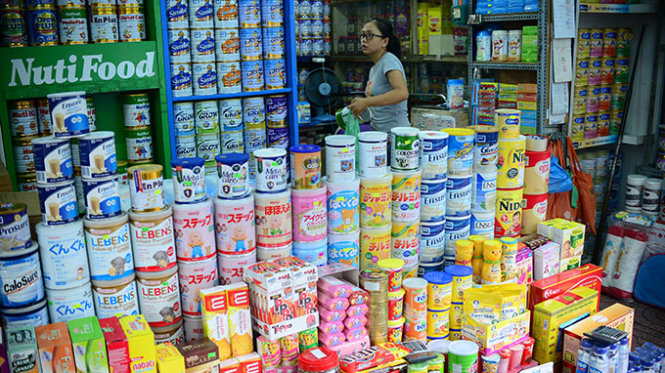Vietnamese customers, who expect to buy milk at cheaper prices after the world price drop began earlier this year, have swallowed a bitter pill when realizing that they had paid more than they should have for the dairy liquid.
>> An audio version of the story is available here
Milk prices on the world market have fallen steadily since March this year, dropping by at least 20-25 percent, or nearly 50 percent for some time.
The rates were at their peak at US$5,100 per ton in April 2014.
But retail milk prices in Vietnam have a tendency to surge, which distributors, producers, and the price management agency claim is due to rising costs.
Imported milk, worth at nearly $1 billion annually, make up about 70 percent of the local demand, from milk used as material for producers to that for direct consumption, according to the Vietnam Dairy Association.
Milk price is forecast to continue to decline by 5-10 percent from now to 2018 in accordance with what Vietnam has committed when entering into many regional and international trade agreements, especially with milk powerhouses like New Zealand and Australia, the association said.
In addition, demand in some major markets, such as China, is declining, which leads to surplus supply on the global market.
Increased costs, including Vietnamese dong’s devaluation, taken into account
Many parents who are raising children told Tuoi Tre (Youth) newspaper that they have heard about the declining world price, but their monthly spending on milk for their children has yet to go down, and it has even inched up.
Minh Hang from District 7, Ho Chi Minh City said buying milk for two kids costs her VND3 million ($132) a month.
The amount of money set aside for baby formula is still equal to that a year ago even though she has chosen cheaper milk for her first kid, she said.
Hoang, a milk shop owner on Nguyen Thong Street in District 3, affirmed milk prices have never decreased since the beginning of the year, and the prices of some imported dairy products have even risen slightly.
In Hanoi, many milk types, from those for children under six to those for pregnant women and the elderly, have seen their prices increase by VND15,000-30,000 per can compared to the rates in June 2015.
Explaining the reasons for such price hikes, a milk shop owner on Le Hong Phong Street, Ha Dong District said the devaluation of the dong is to blame.
Vietnam last month depreciated the dong for the third time this year and widened the trading band for VND-USD transactions from one percent to three percent, a move the State Bank made to cope with the devaluation of the Chinese yuan.
All this technically caused the Vietnamese dong to lose five percent of its value.
Previously, those dairy firms that targeted to guarantee sales to grow 10-12 percent annually only needed to increase their retail price and yield by 7-10 percent and 5-10 percent, respectively.
However, according to dairy companies, the consumption of milk in the Vietnamese has declined in both volume and value, with powdered milk leading the drop.
This is somewhat unexpected because powdered milk is an essential product for children, and according to statistics, 65 percent of milk consumers in Vietnam nowadays are children.
The deputy director of a dairy company in Vietnam told Tuoi Tre that plummeting imported milk prices cannot help businesses as other expenses, such as staff salaries and management costs, are escalating.
As the property rent and utility bills of wholesalers continue to go up, the profits allocated by the manufacturers have to be raised to offset the costs, he said.
The director of external affairs of a foreign dairy company also said cost has risen continuously in the context of the dong’s depreciation, while sales continue to go down.
Talking to Tuoi Tre, Nguyen Anh Tuan, director of the Price Management Department under the Ministry of Finance, said the prices of some sorts of milk on the global market have plummeted since April, citing data from the Department of Agriculture.
But it takes a certain period of time for dairy producers to negotiate prices to reach a deal to import milk, and then manufacture the products and sell them to the market, Tuan said.
So a price reduction will not take effect immediately, he added.
|
According to statistics, a Vietnamese person consumes about 14 liters of milk per year, a figure which is quite low compared to other regional countries, whose consumption ranges from 20 to 30 liters per person per annum. The prices of milk for Vietnamese children remain the highest in Southeast Asia despite the falling cost of raw milk, Dinh Tien Dung, Minister of Finance, said in a meeting in Hanoi in June. The average price of formula milk products for children under six years old in Vietnam is around US$16 per kilogram, considerably higher than that in other Southeast Asian countries, including Thailand (14 percent), the Philippines (24 percent), Malaysia (46 percent), and Indonesia (60 percent), Minister Dung said. |
Like us on Facebook or follow us on Twitter to get the latest news about Vietnam!


















































